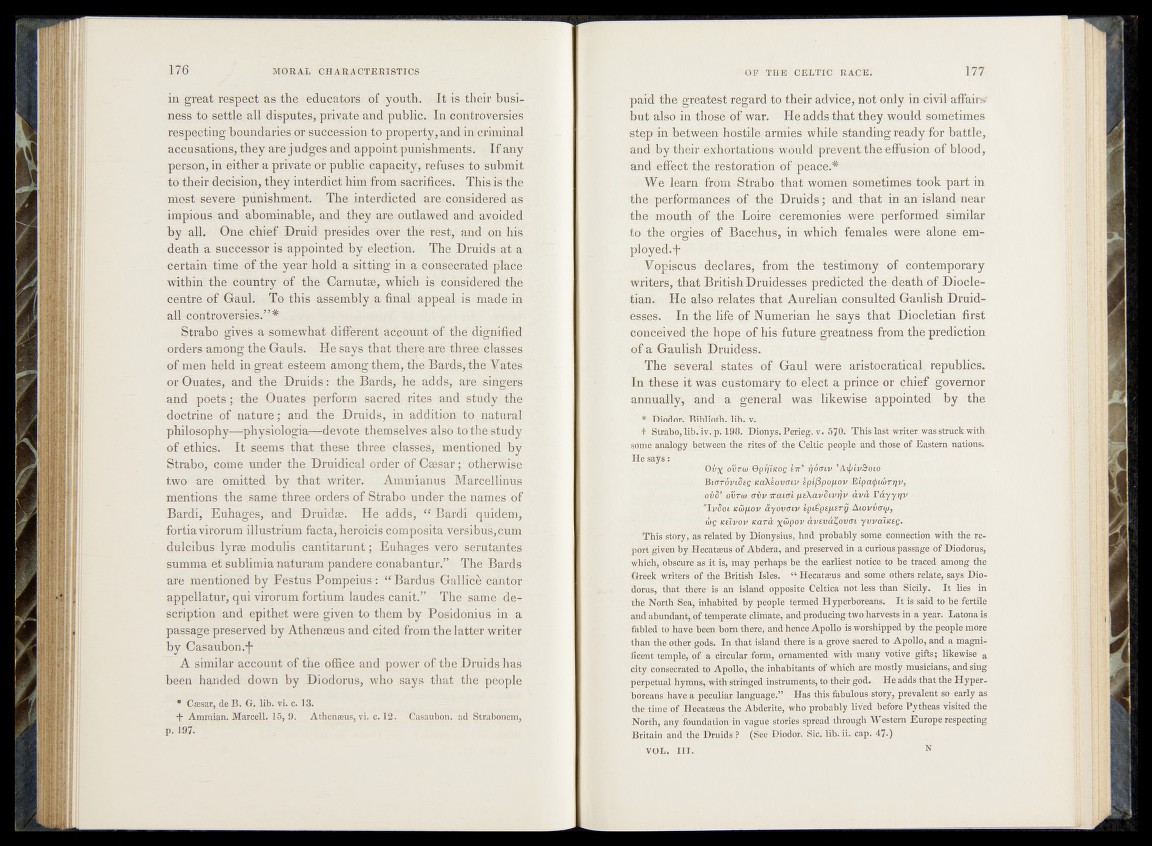
in great respect as the educators of youth. It is their business
to settle all disputes, private and public. In controversies
respecting boundaries or succession to property, and in-criminal
accusations, they are j udges and appoint punishments. If any
person, in either a private or public capacity, refuses to submit
to their decision, they interdict him from sacrifices. ThisMffhe
most severe punishment. The interdicted are considered as
impious and abominable, and they are outlawed and avoided
by all. One chief Druid presides over the rest, and on his
death a successor is appointed by election. The Druids a t a
certain time of the year hold a -sitting in a consecrated place
within the country of the Carnutse, which is considered; the
centre of Gaul. To this assembly a final appeal is made in
all controversies.” *
Strabo gives a somewhat different account of- the dignified
ntders ainon| the Gauls. He says that -th^ie af£ ^hrSe.-elassaes
of men held in great esteem among them, the Bards, the Vates
or Ouates, and the Druids: the Bards* he adds* are-singers
and p oets; the Ouates perform sacred rites and stu®^|ihe
doctrine of n a tu re ; and the Druids, in addition .to natural
philosophy—physiologia—devote themselves also to the?s|udy
of ethics. I t seems that these three-classes, mentioned'ii'y
Strabo, come under the Druidical order of C aesarotherwise
two are omitted by that writer. Ammianus Marcellinus
mentions the same three orders of Strabo under the names of
Bardi, Euhages, and Druidaff He adds, “ Bardi quidem,
fortiavirorum illustrium facta, heroicis composita fersibus, cum
dnlcibus lyr® modulisjeantitarunt; Euh^esrvero terutgjites
summa et sublimia naturam pandere conabantun” The Bards
are mentioned by Festus Pompeius: “ Bardus: Gallic^’ cantor
appellatur, qui virorum for^Mn laudes canit.” The same jd.e^
scription and epithet were given to them by Posidonius in a
passage preserved by Athenseus and cited from the latter writer
by Casaufoon.-f*
A similar account of the office and power of the Druids has
been handed down by Diodorus, .who .says that the people
* Cassar, de B. G. lib. vi. c. 13.
f Ammian. Marcell. 15, 9. Athenseus, vi. c. 12. Casaubon. ad Strabonem,
p. 197.
paid the greatest regard to their advice, not only in civil affairs
but also in those:of war. He adds that they would sometimes
step in between hostile armies while standing ready for battle,
and by their exhortations would prevent’the effusion of blood,
and effect- the-restoration o f peaceV*
We Team ffrom .fStrabovthat women sometimes took part in
the< performances of/the Druids*; and that in an island near
the mouth of *.the 'Loire 1 ceremfondtef vweie performed similar
to the orgies of Bacchus, in which females were alone employed1,
if*
Vopiseus -declares, from the testimony of contemporary
writers, that British Druidesses predicted the death of Diocletian.
He also relates that Aurelian conjsnlted Gaulish Druid-
)fesSie|. In the life of Numerian he sayq.that Diocletian first
conceded the hop,e of his future greatness from the prediction
of a Gaulish Druidess. ;
The several s faxes->of Gaul were aristocratical, republics.
In these it was. customary to e le c tp firie e or chief governor
annually, an d ''a general was likewise appointed by the
* Diodor/ Bibltoth. lib.i v. ■
, + Str&.bbj lib.|W.*p? 198.' Dion.ys. Perieg. v. 570; This last writer was struck with,
some analogy betyfeenXhe rites of tl|e Celtic people and those of Eastern nations.
He saffi
4 (SprfiKOg f7r’ ^ i v S r o
Biafovideg KtiXiovmv kpijipopov Eipatpitoryv,
ovd* ofirw <rvv iraurl psXavSivrjv a va rdyyijv.
*Iv5oi Kwp,ov ayovaiv ipi€ptfiBry Awvvcnp,
dig kbJvov Ka ra x&pov a v s va Z o va i ■f vvniKeg-.
' (Phis story, as related by Dionysius, had^prObably some. Connection with the report
given by,Hecat8eds of Abdera, and preserved in a curiouspassage of Diodorus,
which, Obscure as it is, may perhaps be. the earliest notice? to be traced among the
Greek writers of the British Isles. “ Hecataeus and some others relate, says Diodorus,
that there’ is an island opposite Celtica not less thanr Sialyl I t lies in
th'e. North Sea, inhabited by people termed Hyperboreans. I t is-'said to be fertile
and abundant, of temperate climate, and producing two harvests in a year. Latona is
fabled to have been bom there, and hence Apollo is worshipped by the people^more
than the other gods. In that island there is a grove sacred to Apollo, and a magnificent
temple, of a circular form, ornamented tvith many votive gifts; likewise a
city consecrated to Apollo, the inhabitants of which are mostly musicians, and sing
perpetual hymns, w-ith stringed instruments, to their god. He adds that the Hyperboreans
have a peculiar language.” Has this fabulous story, prevalent so early as
the time of Hecatseus the Abderite,/who probably lived before Pytheas visited the
North, any foundation in vague stofies spread through Western Europe respecting
Britain and the Druids ? (See Diodor. Sic. lib. ii. cap. 47.)